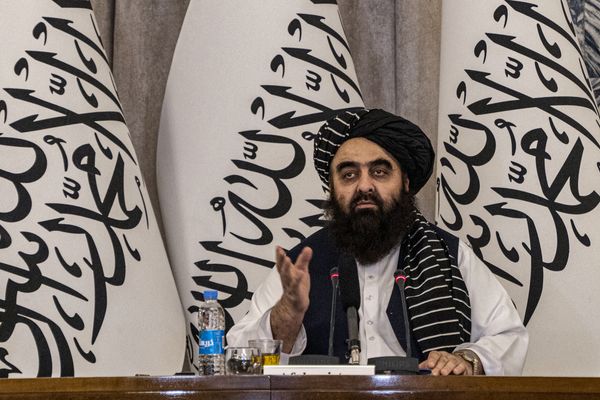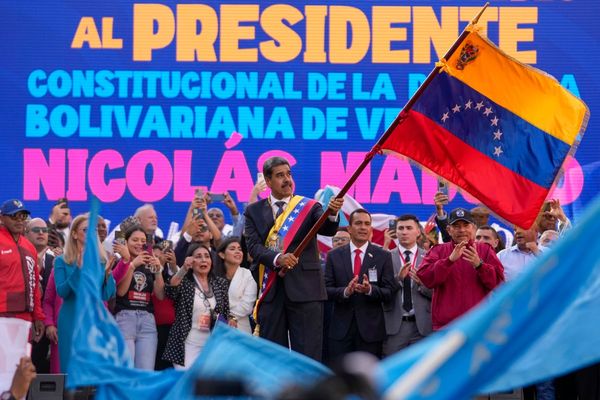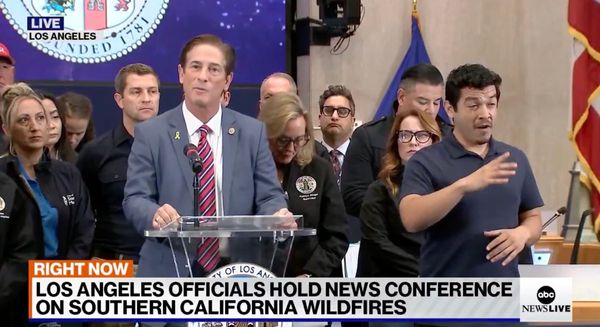
It took six months, but several of Georgia’s opposition parties have reluctantly signed a European Union-brokered deal that ended their protest against the ruling Georgian Dream party. The agreement comes after a protracted dispute over accusations by the opposition that Georgian Dream rigged last October’s parliamentary elections and was leading the country back into authoritarianism. But the two biggest opposition parties, the United National Movement (UNM) and European Georgia, refused to accept the deal, making an end to the political deadlock uncertain.
Tuesday will see parts of the opposition reenter parliament for the first time since the elections under a deal that is expected to free key opposition leaders and make parliamentary elections use proportional representation among other proposed reforms. Opposition groups, civil society experts, and activists say they hope this document will set the stage for a coalition-style government that will safeguard the country from any one party or person abusing power and undermining democracy—a worry that has haunted the small nation ever since it won independence from the Soviet Union in 1991.
They also say the existing majoritarian-style system of government makes it impossible for them to exercise power in parliament and accuse Russia-made billionaire and, briefly, Georgia’s prime minister, Bidzina Ivanishvili, of running a shadow government from behind the scenes since he officially stepped down in 2013 after a year in office. Any party running on a pro-Russia platform in Georgia is dead on arrival—especially since Russia invaded the country in 2008 and illegally occupies 20 percent of its territory—but there have been accusations of shadowy ties between Ivanishvili and the Kremlin.
The new deal sets the terms for changing the system—but it’s just a handshake arrangement. Inking it into law will take even more work. And arranging the deal wasn’t just about domestic politics. The EU and the United States, which gave quiet background support, were very persistent in pushing the Georgians to sign the document over fears the Kremlin would manipulate the situation and disrupt the country’s increasing alignment with the West.
“Their position was because of these challenges that Georgia’s facing geopolitically. It is crucial for the country to end this political crisis,” said Zurab Japaridze, leader and co-founder of the Girchi opposition party and a signee of the deal. “I decided I might not be in the position to see the bigger picture, so I just trust our strategic partners because it is vital for my country to become a member of NATO and the European Union.”
But the bargaining process was a tempestuous and ever-changing one that shifted until the last minute; during the process of writing this article, several of the people I interviewed switched positions, resigned their jobs, or quit their political parties. Technically, no reforms have been enacted, and all parties are supposed to return back to work tomorrow in “good faith.”
Tomorrow will see only the beginning of the reform and reconciliation process.
Since independence, Georgia has experienced a meteoric ascent from a war-torn, post-Soviet Union backwater to a regional model of democratic institution-building and integration with the West. A small Caucasus nation of less than 4 million people that could once hardly supply its citizens with consistent water and electricity is now aspiring to NATO and EU membership.
But the path has also been a deeply tumultuous one. The country has come a long way since it elected its first president, the pro-Western Zviad Gamsakhurdia, in 1991, who was deposed in a violent coup a year into his tenure amid a two-year civil war. He died under unclear circumstances in 1993 and was eventually replaced by his arch rival Eduard Shevardnadze, whose eight years in power, from 1995 to 2003, were rife with corruption and economic and political stagnation.
Georgians forced him out of office in 2003 after massive electoral violations and handed power to then-35-year old, Columbia University-educated Mikheil Saakashvili. Saakashvili pushed the country toward the West but faced a brief lost war with Russia in 2008. He was forced out of office in 2012 and convicted of abuse of power in absentia.
Then came Georgian Dream and Ivanishvili, who promised reform—and staving off Russia—without abuses of power. It didn’t take long for opposition leaders to accuse Ivanishvili of money laundering, politically motivated prosecutions, undermining business projects not to his liking, and filling critical political positions with people once under his employment.
The main accusations against Georgian Dream over the October 2020 parliamentary elections include using administrative resources for political campaigning, voter intimidation at the polls, and weakening the parliamentary structure so the ruling party didn’t have to negotiate with the opposition. Transparency International notes state investigative resources were used to discredit political opponents, and Georgian Dream candidates campaigned at state-funded projects and used state employees for political purposes.
Each time Georgians gave one person the keys to the country, they locked everyone else out of the process and became a different version of the power-hungry politician they claimed they’d never become, experts say.
“What we have seen in recent Georgian history is that one-party rule always fails,” said Eto Buziashvili, a research assistant for the Caucasus at the Atlantic Council’s Digital Forensic Research Lab. “They started okay, and then they would begin consolidating power and using state institutions for their political motives. The only way to end this kind of election system in Georgia is coalition rule in the parliament.”
The opposition believes the current mixed electoral system allows for the ruling party to undercut the opposition’s power to the point of uselessness. To help address that, the deal calls for future parliamentary elections to be proportional and for early parliamentary elections to take place next year if Georgian Dream gets less than 43 percent of the vote in the upcoming local elections in October. The deal also outlines power-sharing rules that will allow opposition parties to secure the chairs of important committees and explains a pathway to reforming the judiciary, which the opposition claims is rife with corruption.
It also calls for amnesty for two imprisoned opposition leaders: Giorgi Rurua, a stakeholder of one of the opposition channels who is currently serving a prison sentence in connection to illegal gun possession charges critics say were politically motivated, and Nika Melia, chairperson of the United National Movement who is accused of inciting a riot during anti-government protests in June 2019.
Neither side is happy with the deal—or fully trusting their opponents to keep it. But in interviews, they agree it will stabilize the country’s politics, regain the confidence of their constituents, and quell fears in Washington and Brussels that the Kremlin could manipulate the ongoing dysfunction.
Yet with key players absent, the deal may not hold up. Georgian Dream holds 90 of the 150 parliamentary seats while UMN has 36 seats and European Georgia has five seats. The rest of the parties—Lelo for Georgia, Strategy Builder, the Alliance of Patriots of Georgia, Girchi, Union of Citizens, and the Georgian Labour Party—have four or less seats.
“This is not an ideal deal,” said Grigol Gegelia, the head of foreign affairs in the Lelo for Georgia party, which signed the EU document. “We realize that this is a patriotic compromise from our side. Of course, we took notice of the opinions of our Western partners of the very difficult geopolitical circumstances in which the country finds itself and that Georgia needs a multiparty parliament and political stability in order to advance its Euro-Atlantic aspirations.”
UNM isn’t willing to even consider a return to parliament until its chairperson, Melia, is released and granted amnesty. He has refused to pay bail—even refusing to allow the EU or anyone else to pick up the tab—on grounds the charges are politically motivated. One of European Georgia’s founders, Giorgi Kandelaki, told Foreign Policy the group is so unsatisfied with the document that it will continue sitting out of parliament until better language is agreed on. These positions frustrate other opposition leaders because they feel it weakens their negotiating power, a charge UNM rejects.
“We had the responsibility of unifying the opposition,” said Khatia Dekanoidze, a member of UNM’s political counsel. “We were the avant-garde of unity. … Everyone has to realize that the main leader of the Georgian opposition, not only our party, is in prison. So the political crisis can’t be solved” until he is free and leads the negotiations.
Salome Samadashvili, the only UNM member to sign the deal, said she saw no need to prolong the protests because the opposition no longer wields any real leverage. As she saw it, the deal was the only way to get Melia out of prison, and her colleagues’ decision not to sign on has weakened the opposition’s bargaining power. The deal isn’t perfect, she said, but she believes it was strategically expedient to sign it. “If the opposition wins the regional elections, we can demand early elections in 2022,” she said.
Georgian Dream isn’t too enthusiastic about the compromise either. It argues the thresholds for certain provisions in the deal were set arbitrarily and there is no need for coalitions to run the country, especially during the pandemic. Giorgi Khelashvili, a senior leader in Georgian Dream, accused the hold-out parties of being bad-faith actors. “The very first line of the agreement says that the opposition should enter the parliament and then take off the discussions from there,” he said. “By refusing to sign the document in the first place, they are already putting preconditions into the document that they did not even sign. So this is their beloved way of behavior: basically boycotting, torpedoing, hijacking any political agreement and then trying to accuse the other side of obstruction.” He denies allegations of vote-rigging or of Ivanishvili’s alleged closeness to Russian President Vladimir Putin.
Civil society leaders and members of the opposition warn Georgians are growing tired of the power struggles. The Shame Movement has been organizing street protests since 2019 in response to what it calls Georgian Dreams’ crackdown on civil society. One of its leaders, Shota Dighmelashvili, said the goal of the movement was to reform the electoral system so no single party would be able to control the politics of the country.
“The whole political spectrum in general was discredited in the view of the general public because they did not feel that there was a political will for a balanced system,” he said. “We demanded a proportional election as a cure to one-party rule and one-man rule, which was cursing Georgia’s politics since it regained its independence from the Soviet Union.”
Opposition parties began joining the Shame Movement’s actions, but Dighmelashvili established strict ground rules. “We told them they could be part of the protests as long as they share our demands for proportional elections, and we urged the whole political spectrum to honor that demand,” he said. “Georgians are tired of this struggle for power. What they want are better political systems and stability.”
The main concern for the opposition now is to rally behind a return to parliament so they can challenge Georgian Dream’s hold on power. Samadashvili believes if Georgians are given a choice, they will avoid the pattern of power, hubris, and crisis that has marked the last three decades.
“People at this point in Georgia’s trajectory of democratic development have realized that they want to disperse political power,” Samadashvili said. “We’ll never go back to the point where people overwhelmingly vote for one leader or any one party because we’ve passed that point of the democratic development of the country.”







